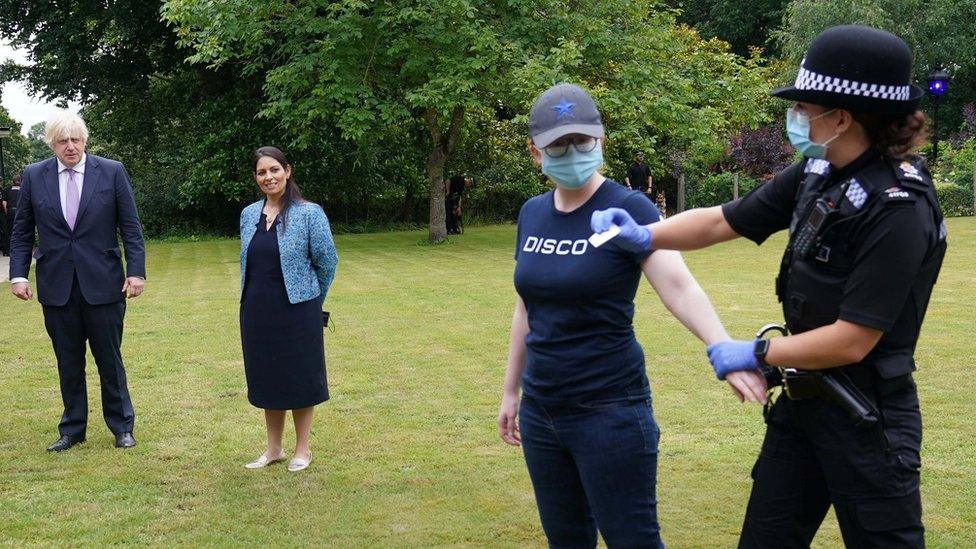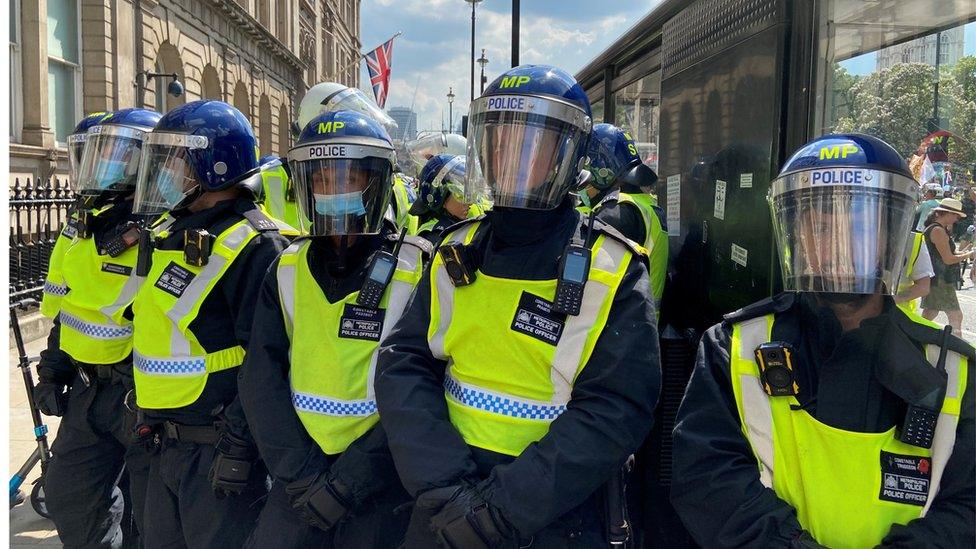Boris Johnson's police numbers claim fact-checked
- Published
The PM defends the wider use of stop and search powers.
Boris Johnson has been interviewed about his crime plan for England and Wales, during which he made a number of claims about crime and policing.
'Two years ago, I said I wanted another 20,000 officers on the streets of our country and we've now got to almost half of the way there'
The government says it has now hired 9,000 of the promised 20,000 additional officers by 2023.
But those new officers should be seen in the context of the reduction in officer numbers since the Conservatives came to power in 2010.
Between March 2010 and September 2017 there was a fall in officer numbers in England and Wales of 21,805.

Police numbers have risen since then, but in the most recent set of figures, external for September 2020 they were still 11,267 below the level in 2010.
'We're putting £15.8bn into supporting our police'
The figure the prime minister was referring to was the police funding settlement for 2021-22, announced in December, external.
The maximum of £15.8bn would be an increase of £636m compared with the previous year, which is about 4%.
The vast bulk of that increase, £415m, will go towards the recruitment of the extra police officers.
Some of the increase in England will depend on whether police and crime commissioners take advantage of being able to add £15 a year to council tax for a typical Band D property.
But there has been criticism from police bosses of the plans to freeze pay for officers earning more than £24,000 a year, which were confirmed last week.
Those earning below £24,000 a year will get an extra £250.
'Section 60 [stop and search] orders can play an important part in fighting crime'
It is far from clear whether stop and search reduces crime.
The type of search Mr Johnson is talking about - called a section 60 - doesn't require police to have "reasonable suspicion" someone has committed a crime, only a belief that a crime "may" take place in the area.
A surge in these searches in parts of London, under a knife crime initiative called Operation Blunt 2, had no effect on police recorded crime compared with boroughs where the searches were not brought in.

And nationally there is no clear correlation between the number of searches and the number of offences. From 2010, fewer people were stopped and searched and there was also a fall in knife crime. Then, around 2014, knife crime started to rise again while the number of stops continued falling.
But, when the use of stop and search fell, the proportion of stops resulting in an arrest did rise. In other words, when the police could search more people indiscriminately, they stopped many more people who weren't committing a crime.
Last year, black people were nine times more likely to be stopped and searched than white people.
'What the statistics on crime now show is that... homicide [is] down about 16%, serious violence down 11%'
Defending his government's record on crime, Mr Johnson pointed to falls in various offences over the past year. His figures are broadly correct but any implication that this is because of government investment in policing would be misleading.
The falls were generally in offences where the perpetrator and victim were not members of the same household, like knife crime, and they coincide with the national lockdowns. Meanwhile there was a big rise in computer-based crimes like fraud.

The Office for National Statistics said, external the fall in these offences "likely reflects a decrease in violence taking place in public spaces during national lockdown restrictions", pointing out other data suggesting there was likely to have been a rise in domestic violence.
It also said that the rise in anti-social behaviour should be seen in the context that most police forces treated breaches of Covid public health restrictions reported to them by members of the public as incidents of anti-social behaviour.
When it comes to homicide, the numbers each year are small and so single events can dramatically change the figures. The number of homicides in 2020 included the 39 deaths of people in a lorry in Essex, at the hands of smugglers.
The 2021 figure is back down to 2016 levels, before which murder and manslaughter offences had been falling roughly consistently since at least 2003.

A SIMPLE GUIDE: How do I protect myself?
AVOIDING CONTACT: The rules on self-isolation and exercise
WHAT WE DON'T KNOW How to understand the death toll
TESTING: Can I get tested for coronavirus?
LOOK-UP TOOL: Check cases in your area



